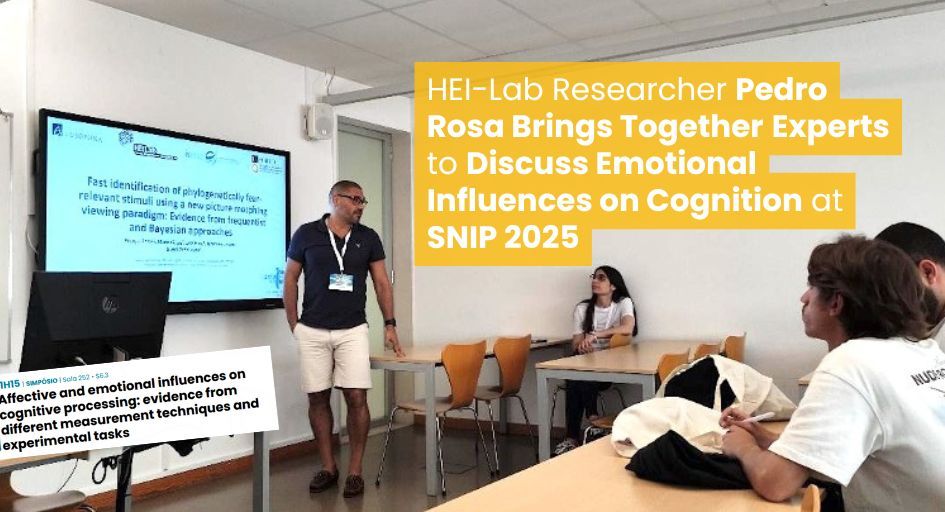News
HEI-Lab Researcher Pedro Rosa Brings Together Experts to Discuss Emotional Influences on Cognition at SNIP 2025

ENG
Professor Dr Pedro J. Rosa, senior researcher at HEI-Lab, organised a symposium dedicated to techniques for the elicitation/induction of affective/emotional states and methods for recording these manifestations in basic cognitive processes, such as perception, attention, and memory. This symposium was held at the most important and wide-ranging psychology science event of the year, the XII National Symposium on Psychological Research (SNIP), which took place at the Faculty of Psychology and Educational Sciences, University of Porto, from 28 to 30 May 2025.
The symposium featured the presentation of three research projects:
- The first, led and presented by Professor Dr José Teles, entitled “Affective distraction and facilitation by emotional arousal during visual attention”, examined the impact of emotional arousal—regardless of valence—on the attention of both young and older adults, demonstrating that arousal influences cognitive performance differently depending on age.
- The second, led and presented by Professor Dr Jorge Oliveira, entitled “Cognitive and Attentional Processing of Sexualised Avatars in Video Games: An Eye-Tracking and Memory Study”, explored the processing of sexualised avatars in video games. It used eye-tracking and memory tasks to assess how emotional arousal affects attentional bias and memory performance.
- The third, led by Professor Dr Pedro J. Rosa, was titled “Fast identification of phylogenetically fear-relevant stimuli using a new picture morphing viewing paradigm: Evidence from frequentist and Bayesian approaches”. This study tested the snake detection hypothesis, investigating how fear-related emotional stimuli modulate reaction times and cognitive processing using a new image morphing technique. It offered significant insights into fear-mediated attentional biases.
PT
O Prof. Dr. Pedro J. Rosa, investigador sénior do HEI-lab, organizou um simpósio dedicado às técnicas de eliciação/indução de estados afetivos/emocionais e formas de registo destas manifestações em processos cognitivos básicos, tais como perceção, atenção e memória. Este simpósio decorreu no evento mais importante e abrangente das ciências Psicológicas deste ano, o XII Simpósio Nacional de Investigação em Psicologia (SNIP), que teve lugar na Faculdade de Psicologia e Ciências da Educação da Universidade do Porto, de 28 a 30 de maio de 2025.
O simpósio consistiu na apresentação de três investigações:
- A primeira investigação, liderada e apresentada pelo Prof. Dr. José Teles, entitulada “Affective distraction and facilitation by emotional arousal during visual attention “ examinou o impacto da ativação emocional — independentemente da valência — na atenção de adultos jovens e mais velhos, demonstrando que a ativação influencia o desempenho cognitivo de forma diferenciada consoante a idade.
- A segunda investigação, liderado e apresentado pelo Prof. Dr. Jorge Oliveira, entitulada “Cognitive and Attentional Processing of Sexualized Avatars in Video Games: An Eye-Tracking and Memory Study “, explorou o processamento de avatares sexualizados em videojogos, recorrendo a tarefas de rastreamento ocular e memória para avaliar de que forma a ativação emocional afeta o viés atencional e o desempenho mnésico.
- A terceira investigação, liderada pelo Prof. Pedro J. Rosa, com o tema “Fast identification of phylogenetically fear-relevant stimuli using a new picture morphing viewing paradigm: Evidence from frequentist and Bayesian approaches” testou a hipótese da deteção de cobras, investigando como estímulos emocionais associados ao medo modulam os tempos de reação e o processamento cognitivo através de uma nova técnica de image morphing, oferecendo contributos relevantes sobre os vieses atencionais mediados pelo medo.
